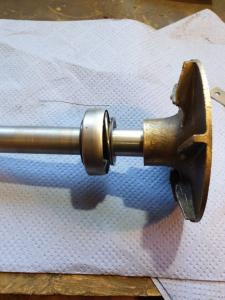Water Pump
Traction Owner’s Club › Forums › Technical › Engine › Water Pump
- This topic has 12 replies, 2 voices, and was last updated 5 years, 8 months ago by Non Member.
-
AuthorPosts
-
14th March 2020 at 3:12 pm #26305
Non Member
ParticipantHi Guys
More trouble that needs expert help (that’s you chaps).
As part of the overhaul of the engine, the water pump got an overhaul, new shaft, brass bearing, gland seal (later type with spring) , ball race all replaced.
All looked good no signs of problems until I started the car , when the car got warm there was a slight water leak from the oiler cap, no signs from the shaft seal.
Question, why is the water coming from the oiler, if the gland seal has failed in some way surely water would emit from the shaft/ brass bearing area ?Anybody got any ideas.
My first thought is to replace the oiler with a grease nipple and pump grease in .!!!
Cheers
Ken
14th March 2020 at 4:09 pm #26308Bernie
ParticipantKen,
It sounds as if you have a bit of a hybrid pump.
Water seems to be by-passing the new seal so, was the mating surface of the pump faced off (to create a smooth surface) before the later type seal was fitted? If so, it may still take a while to bed in so keep an eye on it.
If water is finding its way past the seal and along the shaft it will follow the path of least resistance. So, if the shaft is a good fit in the bushes, the water is likely to make its way up the oilway once it gets that far.
B.…………
14th March 2020 at 4:40 pm #26311Non Member
ParticipantHi Bernie
The “later” seal was a direct replacement for the old one, the mating face was cleaned and smoothed, (that makes what makes it really annoying)
Maybe it will bed in ??
Cheers
Ken
16th March 2020 at 9:29 am #26316Bernie
ParticipantSorry, misundersatandment on my part!
It does sound as if it simply needs to bed in. Grease in the bushes will slow the leak but it is not a cure.
If the leak persists I would be tempted to strip it out to check that the new seal is not “cocked” or damaged. Ensure the roating seal is well bedded to the faced area of the pump body casting and also check that the rubber element is making a good seal with the spindle. A little rust in that area of the shaft could lead to a leak.
B……………
16th March 2020 at 7:49 pm #26322Non Member
ParticipantHi Bernie
All new parts fitted so leak is annoying, so may strip to find problem, just in case it does not “bed ” in
Cheers
Ken
17th March 2020 at 8:18 am #26323Bernie
ParticipantKen,
All new parts and a dressed mating face is certainly a puzzle so is a new component at fault?
<span style=”line-height: 1.5;”>I used to buy water pump seals by the thousand in a previous life. Modern production and quality are good but it is still possible for the odd duff part to get through undetected</span>
If it<span style=”line-height: 1.5;”> does come to stripping the pump out, check the seal for possible manufacturing defects such as splits, cuts or simple poor assembly (I did once come across one missing the spring).</span>
B……
17th March 2020 at 8:21 am #26324Bernie
ParticipantLord knows why posts created on my tablet end up full of jibberish layout instructions but I think the above is still intelligible.
B…
17th March 2020 at 8:52 am #26325Non Member
ParticipantHi Bernie
Understood, even with “jibberish “, now resigned to dismantle, will report findings
Cheers
Ken
22nd March 2020 at 3:58 pm #26340Non Member
ParticipantHi Guys/ Bernie
Took reconditioned pump to pieces due to leakage, may have made classic schoolboy error. Followed previous owner and may have put seal in wrong way round??
Comments please. 22nd March 2020 at 11:01 pm #26341
22nd March 2020 at 11:01 pm #26341Bernie
ParticipantKen,
Not terribly clear in your picture.
Exact seal designs can vary but, basically, the softer (more flexible) “rubber” end goes against the impeller and the hard flat polished – usually ceramic- face mates with the pump body.
The complete seal rotates with the shaft. The internal spring holds the revolving ceramic element tight against the machined face of the casting to form a seal at that point.
B….
23rd March 2020 at 9:54 am #26342Non Member
ParticipantHi Bernie
It appears from your description that I have not made an error after all? Seal looks to be installed the correct way round.
Something is not right and can not figure what, ….new seal, new bush, new shaft, bearing surface smoothed to babies bottom standard……it should not leak !!!
As you know I am a mine of stupid questions….with regards to the brass bush..3 questions.
(1) How does the shaft receive the oil as there is no holes in the bush ?? Would drilling a couples of oil holes be better???
(2) I assume that in line with convention the shaft rotates within the fixed bush???
(3) Or does the shaft and the bush rotate within the casting (off the wall question, getting desperate)
Cheers
Ken
23rd March 2020 at 10:58 am #26343Bernie
Participant1) – Early bushes were sintered bronze which made them porous and allowed oil to penetrate them. If the replacement is solid brass then drill through in line with the oiler
2) – Shaft must rototate within the bush which itself should be an interference fit in the housing.
3) – Off the wall questions serve to present my brain with stimulation, a necessity due to my personal on-going lock-down, now 18 months and counting! Unfortunately, everybody will soon be in a similar situation so perhaps I should start a new forum thread on coping with isolation for the virgins. Hey-ho.
Cheers,
B….
23rd March 2020 at 12:44 pm #26344Non Member
ParticipantCheers Bernie !!
-
AuthorPosts
- You must be logged in to reply to this topic.
